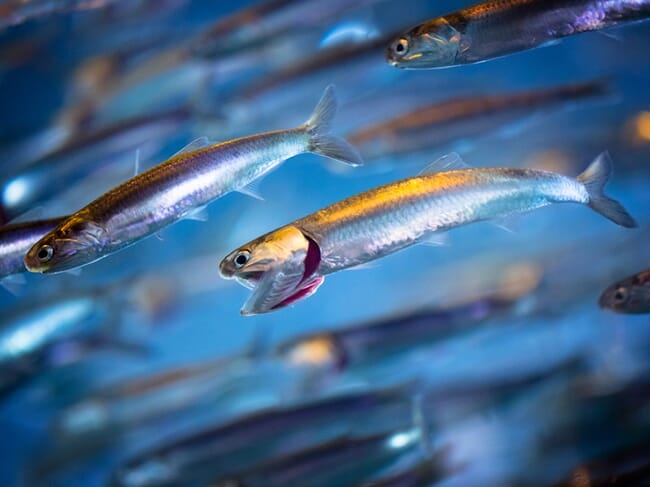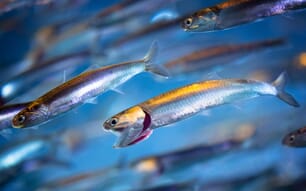
So argues a group of scientists, who have studied the Scottish salmon farming industry, and calculated that replacing wild-caught fish in aquafeeds with fish by-products, such as trimmings, would deliver significant nutritional and sustainability gains.
Fish provides vital nutrition and aquaculture is often presented as a way to relieve pressure on wild fish stocks. But many farmed fish, such as Atlantic salmon, are produced using feeds that contain fish oil and meal, which are made from millions of tonnes of wild-caught fish, such as sardines and Peruvian anchovetas. According to the researchers, most of these small, pelagic species could be eaten directly by humans instead.
A study published in PLOS Sustainability and Transformation today – which was led by a team of scientists from Cambridge, Lancaster and Liverpool universities, as well as environmental NGO Feedback Global – demonstrates that by limiting salmon farming to using feed made from by-products, rather than whole wild-caught fish, 3.7 million tonnes of fish could be left in the sea and global annual seafood production could increase by 6.1 million tonnes.
The team collected data on fish nutrient content, fishmeal and fish oil composition, and salmon production and examined the transfer of micronutrients from feed to fish in Scotland's farmed salmon industry. The results showed that over half of the essential dietary minerals and fatty acids available in wild fish are lost when these are fed to farmed salmon.
Dr David Willer of Cambridge University, who led the study, said in a press release: “Fish and seafood provide a vital and valuable micronutrient-rich food source to people worldwide, and we must make sure we are using this resource efficiently. Eating more wild fish and using alternative feeds in salmon farms can achieve this.”
The team then developed alternative production scenarios where salmon were only produced using fish by-products, and then added more wild-caught fish, mussels or carp for human consumption. All alternative production scenarios produced more seafood that was more nutritious than salmon, and left 66-82 percent of feed fish in the sea.
Feedback’s Dr Karen Luyckx said: “If we want to feed a growing global population well and sustainably, we must stop catching wild fish to feed farmed fish. Until the salmon industry kicks its wild-caught fish oil and fishmeal habit, chefs and retailers should help citizens switch away from unsustainable salmon by offering ultra-nutritious mussels and small oily fish instead.”
Based on their findings on the Scottish salmon industry, the researchers then collected global salmon, fishmeal and oil production data to apply their alternative scenarios at a global scale. One scenario shows that farming more carp and less salmon, using only feed from fish by-products, could leave 3.7 million tonnes of wild fish in the sea, while producing 39 percent more seafood overall.
The authors caution that not enough is known about the source and species composition of fishmeal, but there are positive signs that use of plant-based feeds is growing.
Dr James Robinson of Lancaster University said: “Aquaculture, including salmon farming, has an important role in meeting global food demand, but nutritious wild fish should be prioritised for local consumption rather than salmon feed, particularly if they are caught in food insecure places. Support for alternative feeds can help this transition, but we still need more data on the volumes and species used for fishmeal and fish oil, as this can show where salmon farming places additional pressure on fish stocks.”
Ultimately, the authors call for a reduction in marine aquaculture feeds, as this will offer opportunities to produce more nutritious seafood while reducing pressure on marine ecosystems.
Dr Grace Patterson of Liverpool University said: “This work describes avenues to move towards a more equitable and sustainable model of aquaculture and consumption. Forage fish are key sources of protein and micronutrients in many communities, and can contribute to healthy growth in vulnerable populations. We should take care to protect these resources for the future while maximising the nutritional impact of what we pull from the sea today.”




